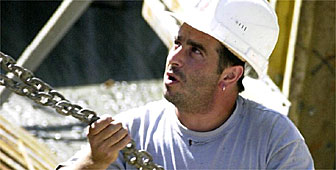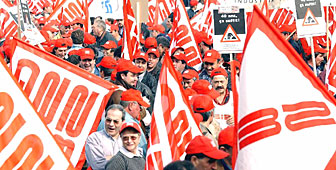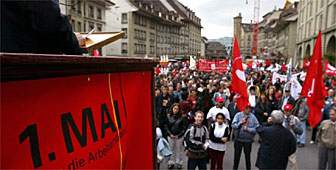Builders’ dispute threatens 50 years of industrial peace

Switzerland's long-standing tradition of avoiding strikes is about to be tested with construction workers threatening to down tools on Monday.
The dispute comes at a time of simmering industrial unrest, with postal workers and public sector employees also at loggerheads with management.
Over the weekend, employers will hold talks with construction unions in a bid to head off Monday’s strike, which is part of a campaign to lower the retirement age for builders.
“This strike is going to be the biggest strike of construction workers in Switzerland since 1947,” Vasco Pedrina, head of the Swiss construction workers union, told swissinfo.
“It will have a great impact on all future negotiations between trade unions and employers.”
According to the Zurich-based newspaper, “Neue Zürcher Zeitung”, Monday’s strike now “appears inevitable”.
Elsewhere Swiss postal workers have threatened to strike against plans to axe 2,500 positions around the country.
Several thousand public sector employees attended a rally in Bern on Friday to protest against planned cantonal spending cuts.
Escalation
Although the disputes are a far cry from the widely-supported general strikes common in Italy and France, some Swiss are wondering whether their much-cherished atmosphere of industrial calm is about to be disrupted.
The last general strike was in 1918, and while tensions have surfaced periodically – notably in the late 1940s and during the economic crisis of the 1990s – Switzerland remains virtually strike-free by international standards.
Thanks to the country’s relative wealth, Swiss employers have long been in a position to maintain workers’ living standards and employment conditions.
Much of the stability has also been built on a “peace accord” signed in 1937 within the engineering and watchmaking industries.
The agreement has helped to ensure more than 50 years of what is commonly known as “work peace” (“Arbeitsfrieden”), by providing a foundation for consensus bargaining between unions and employers.
Arbitration
Industrial action is also rare because both sides must undergo compulsory arbitration, or risk substantial fines.
Beat Kappeler, a former union leader and now a journalist with the weekly “NZZ am Sonntag” newspaper, says low unemployment rates have helped to mitigate industrial strife.
“People prefer to change their job rather than protest through strike action,” Kappeler told swissinfo.
Kappeler says the threat of strike action by construction workers was being driven by a militant, left-leaning union leadership.
“About seven or eight years ago a new leadership took over the union. They are much more left-leaning and they have a conception of society that is more combative and militant,” he says.
“They believe in unbridgeable class-differences within society.”
Industrial relations
Despite the high stakes involved, Kappeler says the dispute will not change Switzerland’s industrial landscape.
“I do not see how such a strike could spread,” he says. “And after the strike, you still have to negotiate, so the leadership will return to the bargaining table.”
However, he warned there could be further disquiet among unions in French-speaking Switzerland “which tend to be a bit more anarchistic”.
But Peter Hasler, director of the Swiss Employers Association, rejects claims that the current wave of industrial unrest will undo the country’s workplace status quo.
“This is not a general threat. The strikes could impact two sectors, whereas other sectors seem pretty calm,” he says. “Moreover, the general economic situation is no worse than during the 1990s.”
Hasler adds that strike threats within the construction industry are common, surfacing every two to three years.
swissinfo, Jacob Greber
November 1918: troops put down the only general strike in Switzerland’s history.
July 1937: an accord within the watchmaking and engineering industries helps ensure 50 years of relative industrial peace.
1945-46: Switzerland experiences a record number of strikes followed by a period of relative calm that extends till today.

In compliance with the JTI standards
More: SWI swissinfo.ch certified by the Journalism Trust Initiative



You can find an overview of ongoing debates with our journalists here. Please join us!
If you want to start a conversation about a topic raised in this article or want to report factual errors, email us at english@swissinfo.ch.